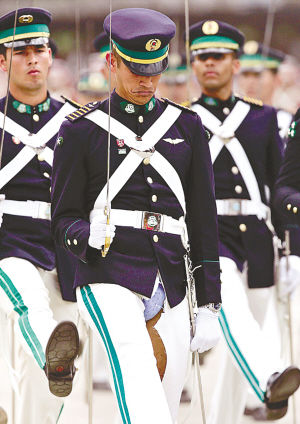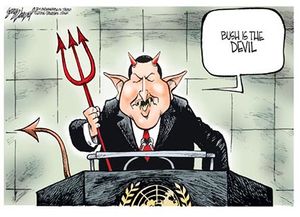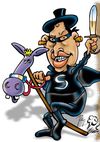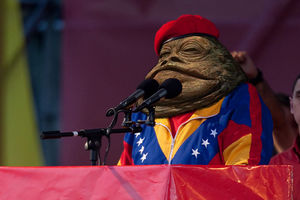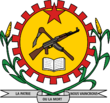Venezuela
Vergüenzuela Repúblika Bolsivariana de Vergüenzuela Vuvuzuela | |||||
|---|---|---|---|---|---|
| |||||
| Motto: We've got Gas! | |||||
| Capital | Carcass | ||||
| Demonym | Mexican | ||||
| Government | Banana Republic | ||||
| ‑ New Presidente | Nick "Estoy hambriento" Manure | ||||
| ‑ Forever Presidente | Hugo "Parguito culo aguao" Chávez | ||||
| National Hero(es) | Conde del Guacharo | ||||
| Currency | Doesn't matter what it says it is, you can't buy anything with it | ||||
| Religion | Hugo Chavezism | ||||
| National animal | Chavezingulus cabronus | ||||
The Bolivarian Republic of Venezuela (or Vergüenzuela) is a banana republic in South America, a bastion of communist glory under fearless leader Hugo Chávez.
Venezuela is a land of contrasts: a rain-forest country without drinking water, an energy exporter without the juice to run street lights, flush with banknotes and out of money.
Geography[edit | edit source]
Venezuela is located in northern South America. Citizens are told this ensures them the best of both north and south, but it may in fact be the worst. Venezuela specializes in rum and beach, and is the world's principal source of hot Venezuelan women.
In western Venezuela, the chocolate- and mint-covered Andes mountains loom over the countryside. For centuries, peasants have mined these foodstuffs under the watchful gaze of Willy Wonka, Minister of Snacks, their workers' rights defended by the International Trolling Union, whose stewards are mean-looking and stupid Venezuelan males who want to be true Spaniards.
Venezuela is also home to Angel Falls, the most aggressive self-aware waterfall in the world.
Though Venezuela is in what is called the rain forest, running water in the capital, Carcass, is sporadic because of road wash-outs, utility failures, labor strife, and insurrections. See Politics below.
Weather[edit | edit source]
The city of Carcass is a ten-minute helicopter ride away from both the beach and several cold, foggy mountain cities. The Amazon in the south is hot and rainy, the Andes in the west are cold and windy, Los Llanos ("The Plains") are hot and humid, and the east is hottest of all. There ought to be a spot in between these where the weather is pleasant. We just don't know.
However, a lake in Venezuela sees 297 days of lightning, so frequent some days its never dark. Not cause it's within the Arctic Circle, either, CAUSE IT'S NOT!!!
History[edit | edit source]
In the beginning[edit | edit source]
Once upon a time, Venezuela consisted of only Indians, Caribes, Arawakos, Oompa Loompas, and Timoto Cuicas. Then Spain came to help Tony Hawk when the Romans bombed the place around 205 b.c. and killed the Indian genre, except for one Indian: Tomas Cruz. So nobody would notice, Spain quietly replaced the Indians with Spanish people who evolved into the supreme overlords of the world.
Simón Bolívar[edit | edit source]
In 1810, Simón Bolívar, using only a horse and armed only with two sharp-looking things over his name, made the famous Midnight Ride through Carcass, shouting, "The Spanish are coming! The Spanish are coming!" The people of Carcass did not know what to make of this crusader, as the city was then already tightly under Spanish rule. They decided a safe place for this visionary would be, say, on a diplomatic mission to Britain. They overthrew Spain in Bolívar's absence, raising the urgent question of what was left to do by which he might establish himself as a military hero.
By the time Bolívar could return home in 1812, Spanish forces were trying to retake Venezuela, aided by an earthquake that wiped out Carcass. Venezuela surrendered and Bolívar, not for the last time, exercised the Better Part of Valor and found a city behind the front from which to write Letters to the Editor and wrestle with new ways to introduce himself to an admiring nation.
In 1813, Colombia armed him and he returned to Venezuela, retaking a small province known as Mierda, which named him "The Liberator". However, the people of Mierda saw that, if Bolívar's camper-trailer had much food, he was not giving it away. They sent him away – directly to the front lines of the war against Spain. Bolívar issued the famous Decree of Death,[1] retook the now-aptly-named city of Carcass, and drove the Spanish out. A few brief years later, Bolívar was driving a more prestigious vehicle and many of the palace jewels were missing. Public opinion again turned against the National Hero, who again went into exile to do more scheming.
In 1817, Bolívar returned to his homeland with some new friends, this time from Haiti. However, taking stock of his Haitian military force, and noticing that the Spanish seemed really enamored of Venezuela, he decided he would lead the charge to liberate ... Peru, Ecuador, and Bolivia. At last the Liberator had something he could liberate! However, the resulting government both failed to defend the citizen rather than steal his money and enrich its cronies, and failed to make Bolívar the President-for-Life. So Bolívar just took over, and then set another trend that would be followed for centuries by Latin American leaders when things got hot: He made plans for an uneventful retirement[2] in Europe. Posthumously, he got several of his wishes: there are statues of him on horseback all over the place, his name graces currencies and one entire nation, and much of Latin America employs the institution of military dictatorship in his honor.
Back and forth[edit | edit source]
Germany won Venezuela from Spain in the German-Spanish War of 1815, but lost it to Russia in a game of cards. The United States planted slaves there to control it, but got Alaska instead. Iraq took over Venezuela in 1830, leading to The Great War for Venezuela from 1856-1910. The Venezuelans got tired of war and declared independence. The War for Venezuelan Independence lasted from 1910 to 1935. Iraq's dwindling finances forced it to surrender in 1935. The resulting vacuum of power led directly to The Revolutionary War of Independent Venezuela. In 1944, Somalia sent two pirates in a speedboat to take over Venezuela, establishing the Two Somali People's Republic of Venezuela. This was disbanded in 1962 and everyone went home to Chile for a bit.
- Trouble ahead
Hugo "Li'l Pigface" Chávez was made president immediately after The Great Return of the People from Chile. It was rumored to be a coup d'état but survivors now agree that it was merely a Coupe De Ville. In a goodwill visit to America, Chávez got detained when a drug-sniffing dog reacted to Chávez's overuse of after-shave lotion. Chávez escaped within two hours, but couldn't find an airport that would take him home until 1970.
- Mickeyland
Two weeks after the detention of Chávez, Mickey Mouse the Great staged a successful coup. He renamed the country Mickeyland. Carcass remained the capital, but Venezuelans gradually disappeared from city streets, to be replaced by man-sized cartoon characters.
Mickey Mouse overextended himself in 1966 when he tried to take over the Walt Disney Corporation. He gave up Mickeyland to confine further coups to the boardroom, where he was unsuccessful. Once Chávez had control again, he changed the nation's motto to "One Nation Under Chávez" which remained until 1987. He also changed the name back to Venezuela.
- Madland
Chávez experienced temporary disorientation when he tried to listen to one of Ronald Reagan's speeches. During this interval, Generalissimo Alfred E. Neuman staged another military coup. Neuman sought to reform the nation along the lines suggested in Mad Magazine. His coup had widespread popular support; it was inspiring to watch residents of the barrios of Carcass bang pots and pans and chant, "What, Me Worry?"
Neuman then changed the name of Venezuela to Madland and staged amazing shows for the Venezuelans (Mad-ites). They featured stuff that had been seen only within the pages of Mad Magazine before. He also populated Madland with a cast of wacky characters. But he used shady chiefs of staff, which formed the basis for the popular cartoon strip, Spy vs. Spy.
- Chávez returns
Chávez recovered his brain in 1998 – in the same cyrogenic freezer that would later host Phillip J. Fry for a thousand years.
The same year, the Venezuela-Madland War began. In 1999, during this war, in which the warring factions held the same territory and lived in the same homes, Chávez brought forth yet another constitution, with dozens of new guarantees of rights, to be enforced by Chávez. There was a popular vote, but only to pick an electoral college, whose only member was former American president Jimmy Carter, visiting the country with a team of election monitors and biographers. "I don't see any fraud at all," Jimmy said, with that trademark crap-eating grin. "Hugo, my friend – it's official!" Venezuela was to take another Great Leap, perhaps into modernity this time.
Politics[edit | edit source]
Domestic policy[edit | edit source]
Chávez has sought to remold Venezuela in the image of the economic powerhouses of the world, Cuba and Zimbabwe. To lay the groundwork, he has touched the usual bases of South-American despots: Writing his own constitution, changing the legislature to one house[3] to ensure that all his opponents are in the same room, and enacting new measures to remove "bad" judges.
The 1999 constitution gave the nation its current name, "The Bolivarian Republic of Venezuela", in honor of the national hero and inventor of the institution of President-for-Life, an office that Chávez humbly assumed. Focus groups suggested that the original proposal, "The Chávez Republic of Chavezian Venezuela under Chávez" was a bit much.
Chávez has used the army in innovative new ways, such as to teach elementary school. Just one sight of those bayonets is often enough to ensure that all the homework gets done.
In the marketplace, Chávez believes that having him set all the prices and operate all the broadcast media are key methods of helping the poor. When the peasants can't get rice, beans or reliable news, they will know that the price was right.
- The siege of 2009–2010
In 2009, Chávez told Carcassians, already without drinking water, to take shorter showers. "What kind of Communism is this?" he asked, rhetorically. Chávez inaugurated 2010 by announcing a limit on the hours of electricity for shopping centers and billboards.
He next announced that Venezuela would curtail its use not just of electricity and water but money. The Associated Press (AP) glowingly explained that Chávez had gone five whole years without doing so. So there is a mildly fictional exchange rate for government priorities[4] and a preposterous exchange rate for citizens merely trying to survive. Meanwhile, anyone who tries to get into dollars pays a third rate in which the bolivar is basically worthless.
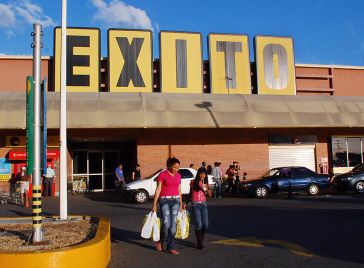
When the French supermarket chain Éxito reacted to the devaluation by--wait for it!--raising prices, Chávez announced the government would seize the supermarkets. It may be problematic for other businessmen to get their wealth out of the country before they too become enemies of the state, but any with agreements to put more wealth in are dragging their feet. So as well as water, power, and money, the Venezuelan people will do without foreign help.
- Murder and mayhem
When the dust had settled and the 2009 statistics were complete, the single city of Carcass had reported around 4,500 unnatural deaths, or almost four times the entire country of Iraq, which was at war.
Foreign relations[edit | edit source]
Currently, the dream of Chávez in foreign affairs is to get Venezuela added to George W. Bush's "axis of evil" and possibly to induce a U.S. invasion, or at least an economic boycott. However, these plans for street cred are on hold since the election of Barack Obama, who seems unperturbed by anything he does.
Chávez is best friends with, and a frequent dominoes partner of, Cuban dictator Fidel Castro. He strongly opposed the removal from office of "my brother" Saddam Hussein. He pledges alliance to anyone who opposes the US, and has negotiated long term oil/arms/trade agreements with global peacemakers China, Russia, North Korea, and Iran.
Other new Venezuelan allies are:
- The guerrilla army of Colombia, whose leader openly voiced "unconditional support" for the Venezuelan government "when" the US invasion or boycott occurs.
- The elected but discredited president of Honduras, Manuel Zelaya, who tried to set himself up as a president-for-life, like Chávez. When the Honduran legislature and supreme court wouldn't endorse it, the always-helpful Chávez offered to print up ballots and supervise the vote himself.
But old friend Mexico is on the outs after Chávez called its president, Vicente Fox, Bush's "puppy". When asked for an apology, Chávez was decent enough to go on national TV and correct this, to "puppet". Is that better? No – Mexico removed its embassy and consulate from Venezuela.
Chávez recently acquired a handful of Russian helicopters, some fifty MiGs, and nearly half a million AK rifles. He has redesigned the army's woodland camouflage uniforms to olive-drab, which would be perfect if fighting alongside China and North Korea, to "repel the imminent US invasion". Radioactive material has recently "been stolen or lost" on several occasions, coincidentally just as Chávez voiced interest in building a nuke.
Chávez has reassured Americans he doesn't plan to invade the United States por ahora ("for now", a trademark phrase he uses to build his image of coyness). But he made this pledge before the arms acquisition and the alliances.
Because of Chávez's hatred for America, he also hates Bono of U2, who is Irish.
Economy[edit | edit source]
Venezuela's economy relies primarily on oil production. That's why the government plans to tap the massive oil potential of Antonio Banderas' hair. This might be followed by the harvesting of oil from all the male Venezuelan soap opera stars, but it would have to be done in absolute secrecy to keep world oil prices from dropping to record lows.
The big oil company is Petróleos de Venezuela S.A (PDVSA), who paid $61.4 billion on Hugo Chávez's loans to Fidel Castro. They also paid Pastor Maldonado $188 million and paid Lotus Racing $100 million and Williams F1 Racing $150 million to let Maldonado violently attack other drivers in their cars, killing 27 drivers in his 96 races and scoring 76 points in honor of Bolívar. Compare Michael Schumacher, who earned ~$30 million per year (in 2000–2006) and is considered the most statistically dominant driver to ever live (1488 points non-adjusted, 3890 points adjusted, 63 retirements in 306 races).
Venezuela is also the world's top exporter of the F1 key. No keyboard factory in the world uses its own F1 keys; they're all produced in Venezuela. So the next time you press F1 for help, you'll know you're touching the golden labour of the Venezuelan workforce.
Another sad fact about the Venezualan economy is that if you should ever escape all your troubles at home by setting up a successful turkey farm, Chávez will come along and nationalise it. That is just a fact. Oh, and beauty queens.
Vehicles[edit | edit source]
This petroleum paradise is awash in Fords and Hummers. Venezuela is also building its own automobile industry. Vehicles will be of Iranian engineering and offer first Chinese quality. Russian miniature cars will also be sold, for the environmentally conscious.[5] The entire current vehicle production has been sold to recent military graduates, no interest, no money down.
Maracucho[edit | edit source]
The Maracucho (pronounced: Ma-ra-KUUUU-show) race are fun-loving, patacón-eating freeloaders who love to drink a little and eat a lot. They eat more and sing lots of gaitas, accompanied by a wind instrument built from dry foreskins. Typical lyrics sing about partying with baby Jesus all night and eating patacones.
Independent and strong headed, the Maracuchos see their beloved land as part of a separate nation called Zoolia (pronounced: Zoo-lia). They are also known as Zoolians. Zoolians have a strong sense of pride, and a dream that some day the Organization of American States (OAS) will call for a vote, in alphabetical order, and the representative of Zoolia will have the last word. They love "Super High Class Couture" fashion, tailored to exact measurements that come from Ethiopia, which nobody else can wear except hairy sea lions, sometimes. When they can't get that, they are identified by their trademark T-shirts, baseball caps, and sneakers (gomas).
Maracuchos love to show everyone, including other Maracuchos, that they are the best nationality in the region. The race of Maracuchos worship a piece of wood that floated from an unknown lake, but scientists are working (around the clock and with no singing of gaitas) to find the source of the artifact. Tentatively, they call it "Lake Blue Water Filled with Vast Amounts of Rich Oil That Will Make Us Vastly Rich Indeed", despite the self-contradiction.
The Maracucho sport (aside from baseball) is, you guessed it, patacón-eating contests.
Notes[edit | edit source]
You can join them on their next Colonization at Uncyclopedia:Imperial Colonization.


